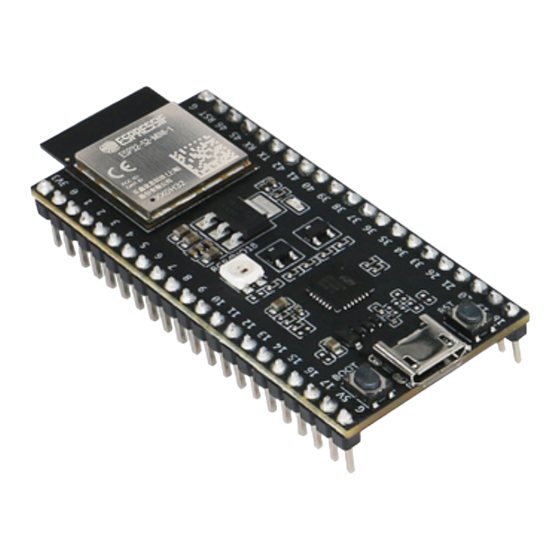
Espressif ESP32-S2 Manuals
Manuals and User Guides for Espressif ESP32-S2. We have 2 Espressif ESP32-S2 manuals available for free PDF download: Programming Manual, User Manual
Espressif ESP32-S2 Programming Manual (1695 pages)
Brand: Espressif
|
Category: Single board computers
|
Size: 54 MB
Table of Contents
-
Get Started14
-
Introduction14
-
Windows73
-
Windows75
-
Windows76
-
IDF Monitor87
-
Wi-Fi98
-
ESP_OK: Succeed104
-
Esp_Err_T110
-
ESP_OK: Succeed110
-
Ethernet180
-
Thread203
-
IP Network Layer208
-
Peripherals API225
-
Gpio & Rtc Gpio260
-
Dedicated GPIO278
-
Lcd317
-
SPI Slave Driver393
-
Touch Sensor408
-
Touch Element429
-
USB Host498
-
ASIO Port518
-
Esp-Mqtt519
-
Esp-Tls530
-
Openssl-Apis540
-
ESP HTTP Client568
-
HTTP Server582
-
HTTPS Server604
-
ICMP Echo606
-
Mdns Service619
-
ESP-Modbus632
-
IP Network Layer675
-
Provisioning API675
-
Storage API706
-
SPI Flash API750
-
System API796
-
App Image Format796
-
Console808
-
Efuse Manager816
-
Esp Https Ota837
-
Freertos861
-
Interrupt Allocation1011
-
Logging Library1016
-
Performance Monitor1039
-
Power Management1041
-
Sleep Modes1049
-
Watchdogs1058
-
System Time1061
-
API Conventions1066
-
Error Handling1066
-
Private Apis1067
-
API Stability1068
-
Introduction1069
-
Customisations1253
-
Related Documents1262
-
API Guides1264
-
Overview1264
-
Modes of Operation1264
-
Application Startup1275
-
Bootloader1277
-
Log Level1277
-
Factory Reset1277
-
Rollback1278
-
Watchdog1278
-
Bootloader Size1279
-
Custom Bootloader1279
-
Build System1280
-
Overview1280
-
Example Project1284
-
Debugging Cmake1294
-
Flash Arguments1298
-
Selecting the Target1299
-
Rules for Wake Stubs1310
-
Implementing a Stub1310
-
Error Handling1314
-
Overview1314
-
Error Codes1314
-
C++ Exceptions1317
-
Esp-Wifi-Mesh1317
-
Overview1317
-
Introduction1318
-
Building a Network1324
-
Managing a Network1329
-
Data Transmission1332
-
Channel Switching1334
-
Performance1337
-
Further Notes1338
-
Core Dump1338
-
Overview1338
-
Configurations1338
-
Event Handling1341
-
Mesh Events1342
-
Bluetooth Events1343
-
Introduction1343
-
Hardware1343
-
Restrictions1345
-
Encryption1345
-
Fatal Errors1345
-
Overview1346
-
Panic Handler1346
-
GDB Stub1349
-
Other Fatal Errors1351
-
Flash Encryption1353
-
Introduction1353
-
Relevant Efuses1354
-
Possible Failures1362
-
Advanced Features1366
-
External RAM1368
-
Technical Details1368
-
Overview1369
-
Tasks1370
-
SMP Scheduler1371
-
Critical Sections1375
-
Misc1376
-
Hardware Abstraction1377
-
Architecture1377
-
LL (Low Level) Layer1378
-
Interrupt Levels1380
-
Notes1380
-
JTAG Debugging1381
-
Introduction1381
-
How It Works1382
-
Setup of Openocd1383
-
Launching Debugger1388
-
Debugging Examples1389
-
Tips and Quirks1393
-
Related Documents1397
-
Overview1422
-
Quick Start1422
-
Memory Types1432
-
DRAM (Data RAM)1432
-
RTC Fast Memory1433
-
RTC Slow Memory1434
-
Lwip1435
-
Supported Apis1435
-
BSD Sockets API1435
-
Netconn API1439
-
Lwip Freertos Task1439
-
Ipv6 Support1440
-
Openthread1443
-
Partition Tables1445
-
Overview1445
-
Performance1450
-
Guides1450
-
RF Calibration1466
-
Partial Calibration1466
-
Full Calibration1466
-
No Calibration1466
-
Secure Boot V21467
-
Background1467
-
Advantages1467
-
Verifying an Image1469
-
Bootloader Size1469
-
Efuse Usage1469
-
Key Management1471
-
Multiple Keys1471
-
Key Revocation1472
-
Technical Details1472
-
Advanced Features1473
-
Thread Local Storage1474
-
Overview1474
-
Freertos Native API1474
-
Pthread API1474
-
C11 Standard1474
-
Tools1475
-
Downloadable Tools1475
-
IDF Docker Image1483
-
Normal Test Cases1514
-
Running Unit Tests1517
-
Mocks1519
-
USB OTG Console1522
-
Limitations1523
-
Wi-Fi Driver1524
-
ESP32-S2 Wi-Fi Scan1532
-
Wi-Fi Reconnect1543
-
Wi-Fi Beacon Timeout1543
-
Wi-Fi Location1550
-
Wi-Fi Sniffer Mode1554
-
Wi-Fi HT20/401557
-
Wi-Fi Qos1557
-
Wi-Fi AMSDU1558
-
Wi-Fi Fragment1558
-
WPS Enrollee1558
-
Wi-Fi Buffer Usage1558
-
Wi-Fi Menuconfig1562
-
Troubleshooting1565
-
Wi-Fi Security1569
-
WPA3-Personal1572
-
Cloud Frameworks1574
-
ESP Rainmaker1574
-
AWS Iot1574
-
Azure Iot1574
-
Google Iot Core1574
-
Aliyun Iot1574
-
Joylink Iot1574
-
Tencent Iot1575
-
Tencentyun Iot1575
-
Baidu Iot1575
-
Esp-Csi1575
-
Esp-Who1576
-
ESP Rainmaker1576
-
ESP-Iot-Solution1576
-
Contributions Guide1578
-
How to Contribute1578
-
Before Contributing1578
-
Pull Request Process1578
-
Legal Part1579
-
Related Documents1579
-
Documenting Code1587
-
Creating Examples1592
-
ESP-IDF Versions1598
-
Releases1598
-
Versioning Scheme1598
-
Support Periods1599
-
Git Workflow1601
-
Updating ESP-IDF1601
-
Resources1604
-
Platformio1604
-
What Is Platformio1604
-
Installation1604
-
Configuration1605
-
Tutorials1605
-
Project Examples1605
-
Next Steps1605
-
Useful Links1605
-
Software Copyrights1606
-
Firmware Components1606
-
Build Tools1607
-
Documentation1607
-
Tjpgdec License1608
Advertisement
Espressif ESP32-S2 User Manual (83 pages)
ESP Test Tools
Brand: Espressif
|
Category: Test Equipment
|
Size: 41 MB
Table of Contents
-
Preparation37
-
Introduction45
-
Overview64
-
Appendix79
-
Faq79
-
RF Testing80

